This week, OncoDaily features ten premier oncology grants that are empowering the next generation of cancer research. From pioneering work in nanotechnology to impactful clinical trials in cancer prevention, these grants are opening doors for innovative discoveries. Whether you’re focused on novel therapeutics, advanced diagnostics, or improving cancer care models, these funding opportunities are designed to accelerate breakthroughs and transform the future of oncology.
1. Innovative Research in Cancer Nanotechnology (R01 Clinical Trial Not Allowed)
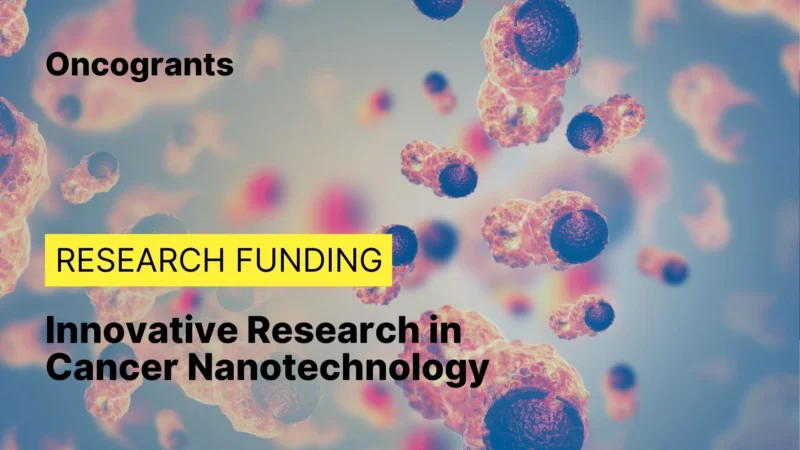
Supports transformative, mechanistic research using nanotechnology to overcome major barriers in cancer biology/oncology, emphasizing fundamental understanding of nano–bio interactions, in vivo delivery to cancer targets, and characterization of diagnostic/detection devices in vitro. Clinical translation and clinical trials are out of scope.
Eligibility criteria:
- Eligible U.S. applicant types include: public/private higher education institutions, nonprofits (with/without 501(c)(3)), for-profits (incl. small businesses), state/local/tribal governments, independent school districts, special districts, public housing authorities, and faith-/community-based and regional organizations.
- Foreign (non-U.S.) organizations are not eligible; non-domestic components of U.S. organizations are not eligible.
- Foreign components (per NIH policy) are allowed.
- Activity code: R01; clinical trials not allowed.
Funding details:
- Award ceiling: USD 475,000.
Deadlines:
Current closing date for applications: May 04, 2026.
Where to go for further information:
- Program details.
- General inquiries: NIH Grants Information — [email protected].
2. Assay development and screening for discovery of chemical probes, drugs or immunomodulators (R01 Clinical Trial Not Allowed)
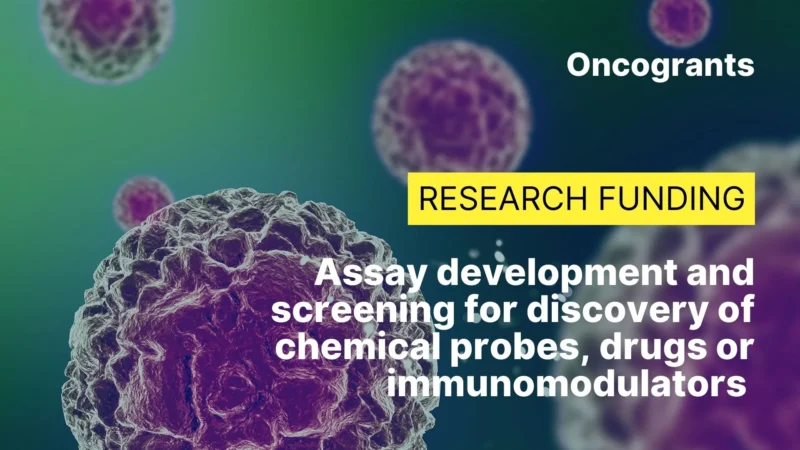
This NIH/NCI funding opportunity supports innovative research to discover novel small molecules that advance cancer biology and therapy. Projects may include assay development, primary screening, and hit validation to identify chemical probes, drug candidates, or immunomodulators. The program is designed to stimulate early-stage discovery and provide critical tools for cancer research and drug development.
Eligibility criteria:
- Open to higher education institutions (public and private).
- Nonprofits with or without 501(c)(3) status.
- For-profit organizations including small businesses.
- State, local, and tribal governments.
- Foreign organizations and foreign components are eligible.
- PD/PI must have an eRA Commons account and all standard NIH registrations.
Funding details:
- Budget not limited, must reflect actual project needs.
- Project period up to 3 years.
- Requests of 500,000 USD or more in direct costs per year require pre-approval from NCI.
Deadline:
- Standard NIH dates: February 5, June 5, October 5 (2025–2026).
- Expiration date: September 8, 2026.
Where to go for further information:
- Program details.
- General grants information: [email protected]
3. Cancer Prevention and Control Clinical Trials Grant Program (R01 Clinical Trial Required)
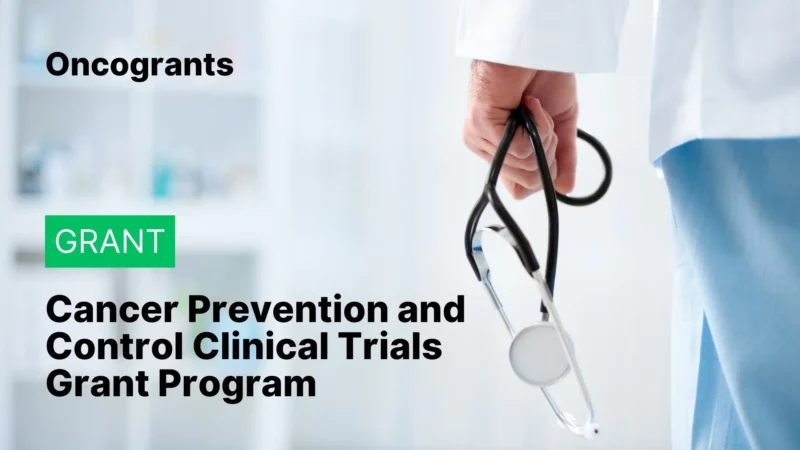
Supports investigator-initiated clinical trials (Phase 0–IV) in cancer prevention and control—spanning early detection, screening, prevention/interception, healthcare delivery, quality of life, supportive/palliative care, and survivorship—to generate evidence that can change clinical practice and/or public health. Diagnosis/oncologic treatment efficacy trials are out of scope.
Eligibility criteria:
- Eligible applicants include U.S. and non-U.S. organizations; foreign institutions and foreign components are allowed.
- PD/PI must have an eRA Commons ID; Multiple PD/PI (MPI) permitted.
- Application must meet the NIH definition of a clinical trial and include required clinical trial materials.
- Not responsive: trials testing oncologic treatments or diagnostic imaging efficacy; Phase 0–II oncologic interventional or imaging trials covered under PAR-25-081.
- If requesting ≥$500,000 in direct costs in any year (excl. consortium F&A), contact NCI program staff ≥8 weeks before submission.
Funding details:
- Project period: up to 5 years.
- Budget: no cap; must reflect actual project needs.
Deadlines:
- Oct 05, 2025, Feb 05, 2026, Jun 05, 2026, Oct 05, 2026.
Where to go for further information:
- Program details (PAR-25-167).
- Cancer prevention/early detection/symptom management trials: Goli Samimi, PhD, MPH — [email protected].
- Cancer control & population sciences trials: Tanya Agurs-Collins, PhD, RD — [email protected].
4. NCI Pragmatic Trials across the Cancer Control Continuum (UG3/UH3, Clinical Trial Required)
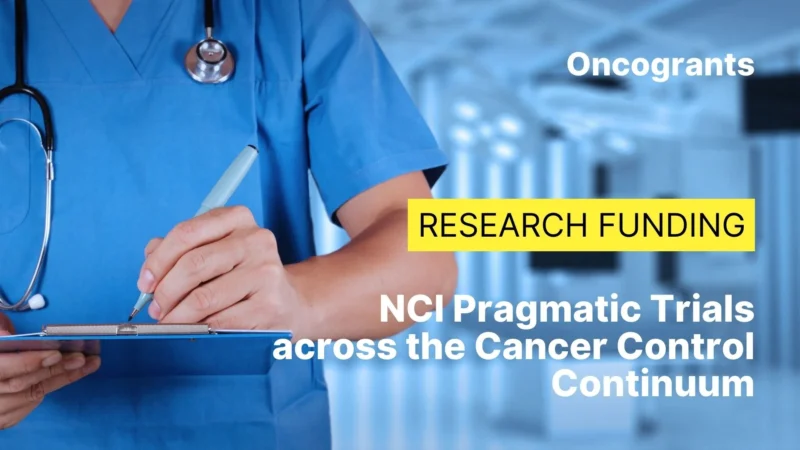
Supports pragmatic clinical trials testing cancer-related interventions across the cancer control continuum, using a UG3/UH3 phased cooperative agreement to refine the intervention (UG3) and conduct the trial (UH3) in real-world U.S. settings, with milestone-based transition.
Eligibility criteria:
- Eligible applicants include U.S. higher education institutions, nonprofits, for-profits, and eligible governments; foreign organizations are not eligible, but foreign components are allowed.
- PD/PI(s) with the skills and resources to carry out the project; Multiple PDs/PIs permitted.
- Clinical trial required with at least one intervention and one control/comparison condition; pragmatic design expected.
- Required registrations: SAM (UEI), eRA Commons, Grants.gov.
- Applicant organizations may submit multiple scientifically distinct applications.
Funding details:
- Mechanism: UG3/UH3 cooperative agreement.
- Budget: up to $500,000 direct costs per year (UG3); up to $750,000 direct costs per year (UH3).
- Project period: up to 2 years (UG3) + up to 4 years (UH3).
Deadline:
- Application due date: Oct 17, 2025.
- FOA expires: Nov 18, 2025.
- All applications due by 5:00 PM local time.
Where to go for further information:
- Program details.
- Scientific inquiries: [email protected].
5. Molecular Imaging of Inflammation in Cancer (R01 Clinical Trial Not Allowed)
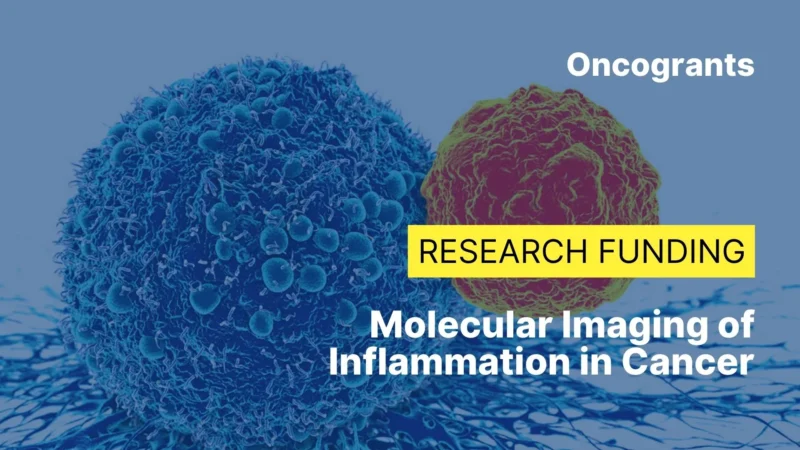
NCI invites R01 applications to develop and apply in vivo molecular imaging to unravel how inflammation shapes cancer initiation, progression, and treatment response. Projects must be multidisciplinary—co-led by imaging and cancer biology investigators—and advance quantitative, multimodal imaging probes/approaches that illuminate immune–tumor interactions and improve monitoring of therapy.
Eligibility Criteria:
- U.S.-based higher education institutions; nonprofits (with/without 501(c)(3)); for-profit organizations (including small businesses).
- State, county, city/township, special district governments; independent school districts; public housing authorities.
- Federally recognized tribal governments and other eligible tribal organizations; faith-based/community-based and regional organizations; eligible federal agencies.
- Foreign organizations are not eligible; foreign components of U.S. organizations are allowed.
- Multiple PD/PI required: at least one in imaging and one in cancer basic science (e.g., biology, immunology, inflammation).
Funding Details:
- Activity code: R01; clinical trial not allowed
- Direct costs: less than 500,000 USD per year (must match project needs)
- Project period: up to 5 years
Deadline:
- Standard NIH due dates through 2025–2027 (e.g., February 5, June 5, October 5 for new applications); expires January 8, 2028.
- Applications due 5:00 PM local time of applicant organization.
Where to Go for Further Information:
- Program details.
- Scientific contact: Charles Lin, Ph.D. — [email protected].
- General grants info: [email protected].
- Submission support: Grants.gov Support — [email protected].
6. Stephen I. Katz Early Stage Investigator Research Project Grant (R01 — Clinical Trial Not Allowed)
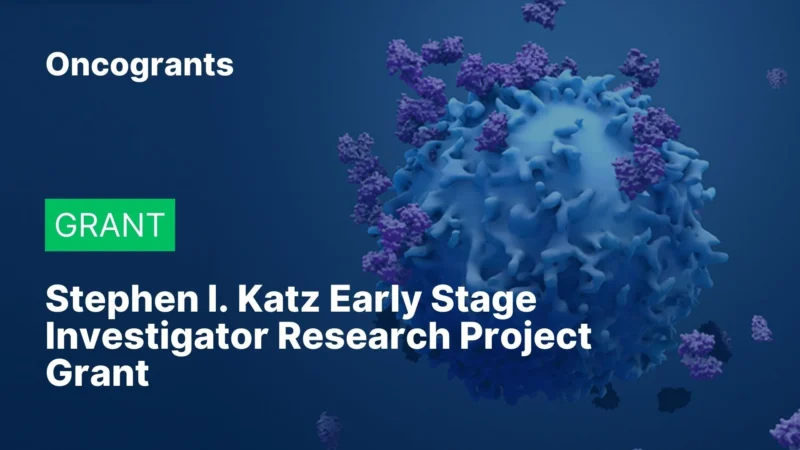
The NIH Stephen I. Katz R01 empowers Early Stage Investigators to launch bold, innovative research in a brand-new direction with no preliminary data. Open across multiple NIH Institutes and Centers, this program backs high-impact ideas that depart from an investigator’s prior work, accelerating discovery across biomedicine while fostering transformative approaches from ESIs.
Eligibility Criteria:
- Eligible applicant organizations: U.S. higher education institutions (public/private), nonprofits (with/without 501(c)(3)), small businesses, other for-profits, state/county/city/township/special district governments, independent school districts, public housing authorities, tribal governments/organizations, faith- and community-based, regional organizations, U.S. territories.
- Ineligible: Non-domestic (non-U.S.) entities; non-domestic components of U.S. organizations; foreign components not allowed.
- Eligible individuals: PD/PI must be an NIH-designated Early Stage Investigator (ESI); for MPIs, all PD/PIs must be ESIs and the project must be a change in direction for each.
- Special requirement: Applications must include a one-page “New Research Direction” attachment describing how the work departs from prior research; no preliminary (unpublished) data allowed.
- Required registrations: SAM (UEI), eRA Commons (with PD/PI Commons ID), Grants.gov.
Funding Details:
- Activity code: R01 (clinical trial not allowed).
- Budget: Not limited; must reflect actual project needs (requests ≥500,000 USD in direct costs in any year require prior contact per NIH policy).
- Project period: Up to 5 years.
- Application types: New; Resubmission.
- Participating NIH components: Multiple ICs (e.g., NCI, NIA, NIAID, NHLBI, NIGMS and others listed in FOA).
Deadline:
- September 26, 2025 (Scientific Review: March 2026; Council: May 2026; Earliest Start: July 2026)/
Where to Go for Further Information:
- Program details.
- General grants questions: [email protected]
7. Stephen I. Katz Early Stage Investigator Research Project Grant (R01 — Basic Experimental Studies with Humans Required)
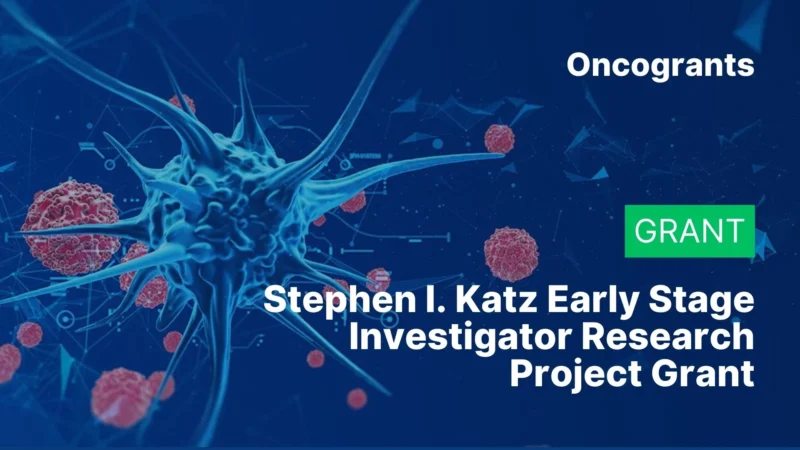
Launch a bold, basic-science clinical trial without preliminary data. The NIH Stephen I. Katz R01 (BESH) funds Early Stage Investigators to pursue a clear change in research direction using prospective human experiments aimed at fundamental discovery.
Eligibility Criteria
- PD/PI must be an NIH-designated Early Stage Investigator (all MPIs must be ESIs).
- Project must be a new research direction; attach a one-page “New Research Direction.”
- No unpublished preliminary data allowed.
- Eligible U.S. applicant types: higher education, nonprofits, small businesses/for-profits, and eligible public entities; foreign organizations/components not allowed.
- Required registrations: SAM (UEI), eRA Commons, Grants.gov.
Funding Details
- Mechanism: R01 (BESH — clinical trial required; basic research).
- Budget: Not limited; must match project needs (≥500,000 USD direct costs/year requires prior contact).
- Project period: Up to 5 years.
- Application types: New; Resubmission.
Deadline
- Standard cycles through 2028; first due date: September 26, 2025 (5:00 PM local).
- FOA expires August 26, 2028.
Where to Go for Further Information
- Program details.
- Help: [email protected].
8. Specialized Programs of Research Excellence in Human Cancers (P50 Clinical Trial Required)
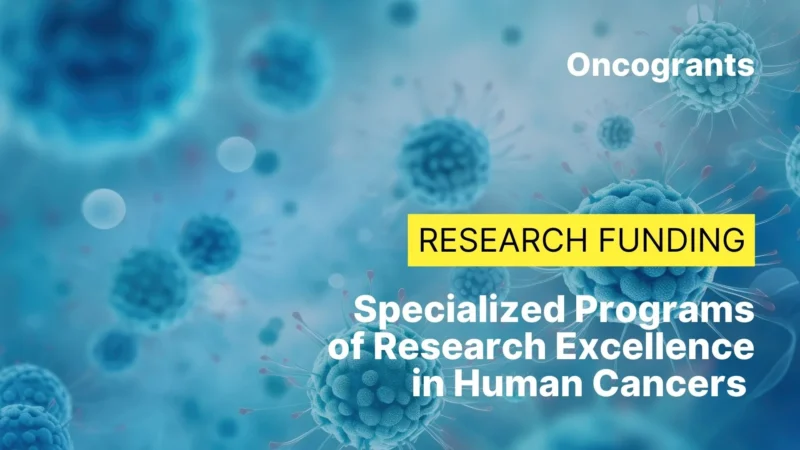
The NCI SPORE program funds multi-project, translational cancer research centers that speed discoveries from bench to bedside. Projects must focus on a specific organ cancer or a biologically related group and achieve a human translational endpoint within the grant period to improve prevention, early detection, diagnosis, and treatment.
Eligibility Criteria:
- Public/state-controlled and private institutions of higher education.
- Nonprofits (with or without 501(c)(3) status).
- For-profit organizations (including small businesses).
- State, county, city/township, and special district governments; independent school districts.
- Public housing authorities/Indian housing authorities.
- Federally recognized Native American tribal governments and other eligible tribal organizations.
- Faith-based/community-based organizations; regional organizations; eligible federal agencies.
- Foreign institutions are not eligible; foreign components of U.S. organizations are allowed.
Funding Details:
- Mechanism: P50 Research Center Grant (SPORE), clinical trial required.
- Budget: Not specified in synopsis; must be appropriate to scope.
- Expected number of awards: Not specified.
Deadline:
- September 25, 2026 (5:00 PM local time of applicant organization).
Where to Go for Further Information:
- Program details.
- General questions: [email protected]
9. International Research Scientist Development Award (K01 Independent Clinical Trial Not Allowed)
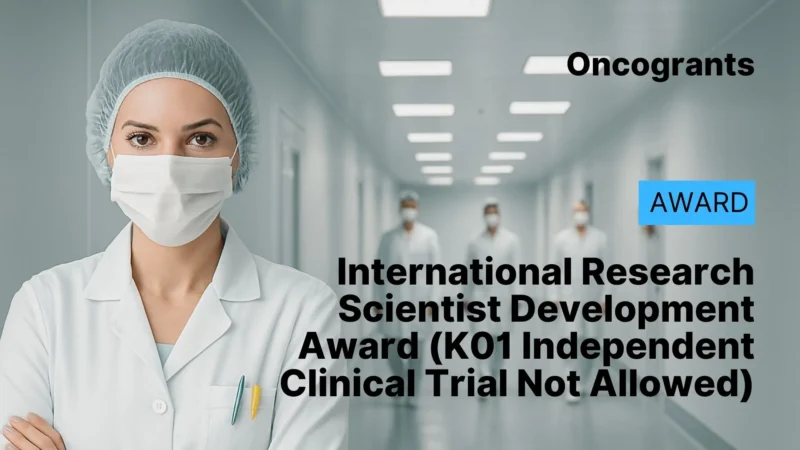
Supports 3–5 years of mentored global health research conducted in an LMIC, with required LMIC and U.S. primary mentors; no independent clinical trial is allowed, though gaining clinical trial experience under a mentor is permitted.
Eligibility criteria:
- PI is a U.S. citizen, non-citizen national, or U.S. permanent resident, at least two years beyond doctoral degree.
- U.S. higher-education applicant institution; foreign organizations are not eligible.
- Two primary mentors: one U.S.-based at the applicant institution and one LMIC-based at the collaborating LMIC institution.
- Minimum 75% effort (9 person-months) on career development and research.
- In-country requirement: ≥50% cumulative effort over the project period in the LMIC and ≥3 months per year in the LMIC.
- eRA Commons and ORCID for PI; Commons accounts for both primary mentors.
- Not eligible if PI has held major independent awards (e.g., R01, P01, center grants, or individual K awards such as
- K01/K08/K23/K99/R00 or equivalents).
Funding details:
- Project period: 3–5 years.
- Salary: up to USD 100,000 per year plus fringe.
- Research development support: up to USD 40,000 per year.
- Indirect costs: 8% of modified total direct costs.
Deadline:
- March 10, 2025; March 09, 2026, 5:00 PM local time.
- FOA expires March 10, 2026.
- Letter of intent: Not applicable.
Where to go for further information:
- Program details.
- Scientific inquiries: [email protected];
- [email protected]; [email protected]; [email protected]; [email protected].
10. NCI Pathway to Independence Award for Early-Stage Postdoctoral Researchers

Supports postdocs transitioning to independent faculty positions through up to 2 years mentored (K99) and 3 years independent (R00) support. Candidates may gain experience in a mentor-led clinical trial but cannot lead one.
Eligibility criteria:
- In a mentored, non-independent postdoc role with ≤2 years of research experience.
- No prior independent/tenure-track role or PI on major research/K awards.
- Minimum 75% effort on the award.
- Requires strong primary mentor and institutional nomination letter.
- U.S. host institution for K99; foreign institutions not eligible (foreign components allowed).
- No independent clinical trial leadership.
Funding details:
- Project period: up to 5 years (K99 up to 2 years, R00 up to 3 years).
- K99: salary up to USD 100,000/year; research support up to USD 30,000/year; indirect costs 8%.
- R00: up to USD 249,000 total costs/year.
Deadline:
- October 14, 2025.
- February 17, 2026.
- June 15, 2026.
- October 14, 2026.
- FOA expires October 15, 2026.
Where to go for further information:
- Program details.
- Scientific contact: Sergey Radaev, NCI — [email protected].
- Peer review contact: Referral Officer — [email protected].
- Grants management contact: Amy Bartosch — [email protected].
- General inquiries: [email protected].
If you want to learn more about Oncogrants, click here.
